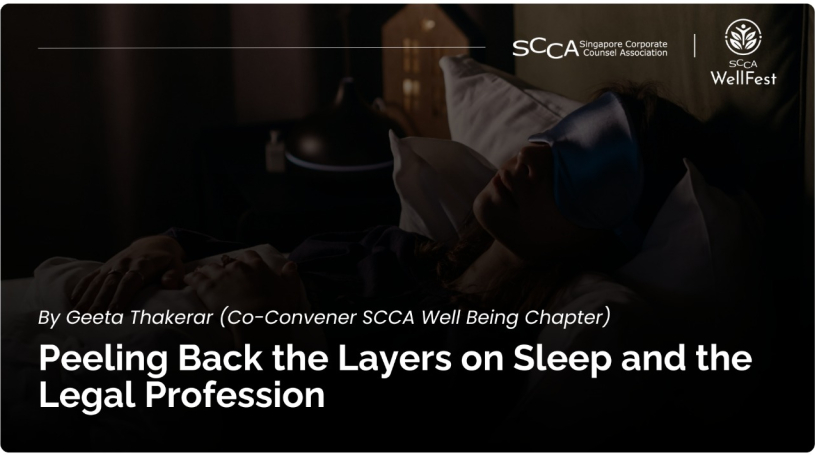Peeling Back the Layers on Sleep and the Legal Profession
By Geeta Thakerar, Co Convenor of SCCA Wellbeing Chapter
13th February 2025
Why are lawyers prone to poor sleeping habits?
Practicing the law is demanding and there is danger on continuously working without proper rest. Working being chronically tired, can lead to ineffective inefficient lawyers. Making mistakes, missing solutions to problems, forgetting, and acting out emotionally can be a result of poor sleeping habits.
There is also the Singaporean culture of staying up late with the expectation of higher productivity and achievement.
Bad sleep is bad for the legal profession and the clients the profession supports, regardless of whether it is as an in-house lawyer, or one in private practice.
Why are legal professionals in particular more prone to sleep deprivation compared to other professions?
There is much data available which suggests the legal profession rates high on stress and low on quality sleep. The current legal culture is not used to addressing the implications of practicing law and impact of poor sleep, including the ability to have quality peaceful sleep.
For many legal professionals, there is some reluctance and discomfort around talking about our need for greater wellbeing, or our need for help to sleep better.
It is therefore very timely, to reflect on training more seriously on sleep hygiene that includes, sleep theory and practical tools that promote restful sleep.
What are your sleep routines? Do you often struggle to get a good night’s sleep. Can you fall asleep quickly? Do you have difficulty remaining asleep or struggle to wake up in the morning?
Evolving neuroscience research shows good quality of sleep is essential. The connection between physical, mental, and emotional ailments related to sleeplessness including increased rates of burnout, stress, depression, anxiety, and addiction in the legal profession is increasing.
Sleep fuels our bodies and brains. It is critical to get sufficient restorative sleep for smooth and effective client services. Good quality sleep is conducive to quick learning and retention, more effective problem solving, creativity and motivation.
Effective leadership and getting enough sleep are complementary. As legal leaders there should be more focus on creating sleep-supportive conversations within the legal teams as well as ensuring policies and practices regarding staying “plugged in” after normal business hours.
Leaders can share their expectations for staff regarding returning emails, phone calls, and texts to clients and other team members after hours. The growing importance to have these important conversations before it is too late.
If you are interested in this conversation and/ or wish to learn more on this topic, then please join us in this ongoing dialogue on Wednesday 12th March 2025
Click here for more and to register.


